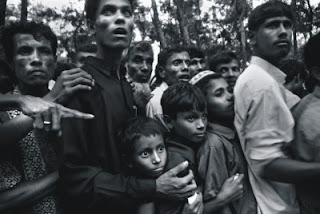Saturday
The Rohingya Life Dead Or life In Bangala desh
MEDECINS San Frontiers (MSF), an international aid agency, has accused Bangladesh of launching a violent crackdown recently against the unregistered Rohingya refugees from Myanmar. The New York Times, BBC, and al-Jazeera English all published the news on the basis of a report released by Paul Critchley, the MSF head of mission in Bangladesh. Quoting Critchley, the New York Times wrote: "They (Rohingyas) cannot receive general food distribution. It is illegal for them to work. All they can legally do in Bangladesh is to starve to death." The MSF report released on February 18 said that Bangladesh has unleashed a crackdown of unprecedented violence against Muslim refugees from neighbouring Myanmar. Ethnic Rohingya refugees who have been living for years in Bangladesh are being seized, beaten and forced back to Myanmar, which they had left to escape persecution and abuse and which does not want them. Some had escaped after being forced into a river that forms the border with Myanmar. Paul Critchley states: "Over the last few months we have treated victims of violence, people who claim to have been beaten by the police. We have treated patients for beating, for machete wounds and for rape ... I have seen small girls going out in the forest to collect fire wood, we have treated young girls and women who have been raped doing this." Agreeing to the fact that international media's information that Rohingyas in Bangladesh are ill-treated is not right, the UNHCR envoy in Bangladesh is on record as saying that the Rohingya problem has spread to the south-east Asian region, including Malaysia and Thailand. The Rohingyas are a Muslim ethnic group of the northern Arakan state of Myanmar who are united by ancient heritage and have lived for many centuries in a contiguous area within well-defined geographical boundaries. They exercised their voting right and right to be elected in all elections of Myanmar held in the colonial period and also in the democratic periods. The ruling military government has deliberately deprived Rohingyas of their citizenship rights. Over 200,000 Rohingyas fled to Bangladesh in 1978 following operations by the Myanmar army. In another wave, over 250,000 Rohingyas fled to Bangladesh during 1991-92 to escape from forced labour, rape, and religious persecution at the hands of the Myanmar military. Despite efforts made by the UN for repatriation of Rohingyas in 2005, a vast majority of them have remained in Bangladesh, unable to return because of the negative attitude of the ruling regime in Myanmar. According to Bangladeshi officials, there are about 100,000 undocumented Rohingyas in Bangladesh who are taking daily wage jobs as farmers, vendors, rickshaw-pullers, and construction labourers. Since they are not accepted in the existing refugee camps run by UNHCR, they have mingled with the local people and are creating a law and order problem as some are allegedly involved in various crimes including smuggling of arms and ammunition and trafficking of addictive drugs. The daily Prothom Alo carried a report on Rohingyas on the first page on February 18. The report said that over 50,000 Rohingyas holding Bangladeshi passport are involved in various criminal activities in Saudi Arabia and thus tarnishing the image of the country. These Rohingyas have entered into Saudi Arabia illegally through India, Pakistan, and Malaysia. Many of them have also gone there in the name of performing Umra using fake Bangladeshi passport. After arriving in Saudi Arabia the Rohingya refugees managed to get Bangladeshi passports from the embassy there in fraudulent ways through brokers and with the help of some unscrupulous employees of the embassy. The involvement of Rohingyas in various criminal activities is not only tarnishing the image of the country, but also squeezing access of Bangladeshi workers in the international job market. The expatriate Bangladeshis of Saudi Arabia have lodged complaints to our foreign minister regarding roguery of the brokers and some of the employees in the embassy who are helping Rohingyas in getting Bangladeshi passport fraudulently. The government is also under diplomatic pressure to bring back nearly 600 Rohingyas confined at Tabhil camp in Jeddah for more than two years, as they hold Bangladesh passports. Ironically, the MSF report on persecution of Rohingyas in Bangladesh was released on the day when the Prothom Alo carried the report on involvement of Rohingyas in criminal activities in Saudi Arabia. The MSF report has also been uploaded onto some websites in a bid to generate sympathy for Rohingya refugees. The main cause of the outflows of Rohingyas from Arakan is religious and political persecution to rid Arakan of Muslims and eventually to turn it into a Buddhist region. The Rohingyas after entering into Bangladesh have been taking advantage of their religious identity and political persecution to draw sympathy of the local people. Many of them reportedly have become voters and obtained Bangladesh passports with the help of local people. Rohingya refugees who have been creating a social and economic crisis have already become a big problem for Bangladesh, both at home and abroad. Bangladesh, with its limited resources, cannot provide them shelter and other assistance for an indefinite period. Repatriation of the Rohingyas to their own country would be the only permanent solution to this problem. So Bangladesh should take the problem seriously with UNHCR to resolve the Rohingya issue immediately.

